March 2015
Responses to February Question of the Month:
Last month, we asked you to share the most important constraint limiting the effectiveness of your work against hunger. Your answers:
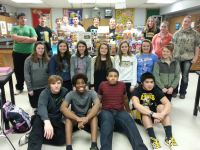 Too little support for objectively effective government nutrition programs. The politics of attacking government and marginalizing low income individuals and families is preventing communities, states, and our country from using highly cost effective programs to provide a springboard for people to improve their lives. – Matt Russell, Drake University Agricultural Law Center
Too little support for objectively effective government nutrition programs. The politics of attacking government and marginalizing low income individuals and families is preventing communities, states, and our country from using highly cost effective programs to provide a springboard for people to improve their lives. – Matt Russell, Drake University Agricultural Law Center
Money and Food. November 2014 was our highest month of usage in our Food Pantry Network's nearly 40 year history. We continue to see increases in use from month to month. Donated food and donated money for purchasing food help us keep up with this rising demand, but it is a constant struggle. – Luke Elzinga, Des Moines Area Religious Council
Food supply and identifying needs of families for our Backpacks Against Hunger school program. – Interstate 35 Middle School Backpacks against Hunger
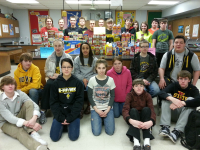
With nearly $50 million in cash and non-cash contributions to food banks in Iowa, we are able make food available to the 389,730 food-insecure Iowans. However, as retail contributions decrease and food prices rise, it is becoming increasingly difficult to meet the demand. Ninety-two percent of cash and non-cash contributions to food banks come from the private sector; the remaining eight-percent comes from federal and county sources. If we want to alleviate hunger in our state, we need to encourage state elected officials to invest in feeding our friends and neighbors. Investing in anti-hunger activities will have a tremendous impact on state’s economy, health, and education. – Cory Berkenes, Iowa Food Bank Association
Lack of flexibility from the Food Bank on how food is distributed and to whom. (income requirements, not allowing for proxy-pick up, self-imposed rules on donated fresh produce, etc). – Anonymous Respondent
Lack of effective coordination among providers, funders and food banks. We are not addressing the systemic problems of fund insecurity, rather we are continuing to use models that we are familiar with and with which we can raise money. – Anonymous Respondent
Emmetsburg Borlaug Scholars Research and Combat Hunger
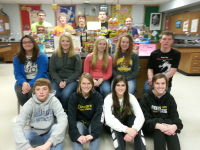 In the spirit of Dr. Norman Borlaug and his legacy of alleviating world hunger; the Emmetsburg High School sophomore class has researched, created posters and presented to their peers the plight of those who are food insecure in various countries. The students also proposed solutions to these barriers to food security.
In the spirit of Dr. Norman Borlaug and his legacy of alleviating world hunger; the Emmetsburg High School sophomore class has researched, created posters and presented to their peers the plight of those who are food insecure in various countries. The students also proposed solutions to these barriers to food security.
In an effort to assist those in their own community the "EHS Borlaug Scholars" responded to a Canned Food Drive challenge where they collected 288 lbs of food that has been delivered to the Upper Des Moines Food Pantry in Palo Alto. The students have the option of turning their research into a formal essay for the honor of attending the World Food Prize Iowa Youth Institute that will be held April 27, 2015 at Iowa State University.
For more information about the EHS Borlaug Scholars, please contact Ms. Tricia Richert at treichert@e-hawks.org or 712-852-2966.
Schools Reduce Food Waste, Improve Menus through “No Thank You” Box
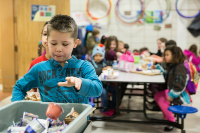 Acting within the framework of federal and state regulations, Des Moines Public Schools are reducing food waste and improving their menus by placing “No Thank You” boxes in ten elementary and middle school cafeterias. The district’s goal is primarily to avoid food waste by serving healthy food that students choose to eat and secondarily to redirect unwanted, healthful food to help students who need it.
Acting within the framework of federal and state regulations, Des Moines Public Schools are reducing food waste and improving their menus by placing “No Thank You” boxes in ten elementary and middle school cafeterias. The district’s goal is primarily to avoid food waste by serving healthy food that students choose to eat and secondarily to redirect unwanted, healthful food to help students who need it.
The No Thank You boxes are placed near the cafeteria doors next to the garbage cans and give students the option of returning uneaten food items such as apples, bananas, and unopened cereal bowls. The returned food is inspected for integrity, washed, and given to the school nurse, who distributes it to students who are hungry or need to take food with their medicine. In partnership with the Food Bank of Iowa, the district is including some of the rescued food in its Backpack Buddies program.
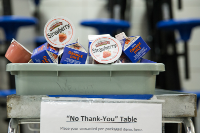 In addition to rescuing unwanted but wholesome food, a primary objective of the No Thank You Box program is to improve the school menu by discovering and replacing the food items that are most often returned. Administration already knows from production figures how many of each food item is taken, but production figures alone do not show how many of the items taken are actually consumed. The No Thank You Box helps bridge this gap by indicating how many items are taken but not eaten.
In addition to rescuing unwanted but wholesome food, a primary objective of the No Thank You Box program is to improve the school menu by discovering and replacing the food items that are most often returned. Administration already knows from production figures how many of each food item is taken, but production figures alone do not show how many of the items taken are actually consumed. The No Thank You Box helps bridge this gap by indicating how many items are taken but not eaten.
A common concern with school food rescue programs is that students will decide not to eat food that they would otherwise consume so that they can share it with others. The Des Moines Public Schools addressed this concern in two ways:
- They do not advertise to their students what happens with the rescued food. Students know that the food doesn’t go into the garbage, but they are not told that it goes to the school nurse for distribution to kids who might be hungry.
- The name “No Thank You Box” was deliberately chosen instead of a “Sharing Table” name, in order to downplay the generosity aspects of the program.
Additional suggestions include:
- Because the primary goal is to improve the menu so that less food needs to be rescued, it is important not to evaluate school food rescue programs solely based on the amount of food rescued.
- Partnerships and collaboration are essential for this type of work. Outside partners include the Food Bank of Iowa and the FoodCorps VISTA program. Internal partners include school administration, food service personnel, nurses and teachers.
For more information about the Des Moines Public Schools food rescue program, please contact Ms. Amanda Miller at amanda.miller@dmschools.org or 515-242-8308.
Photo Credits: Top Three: EHS Borlaug Scholars food drive, Bottom Two: DMPS Food Rescue Program

